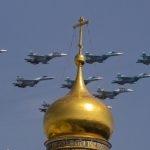
France’s request for the EU’s Ukraine war fund to include a ‘buy-European’-clause when countries purchase armament together keeps complicating member states’ efforts to find an agreement on the file before the next EU summit on 21-22 March.
EU member states have held weeks of intense discussions around the reform of the new European Peace Facility, which has been reimbursing EU countries for their weapons donations to Kyiv for almost two years.
Questions remain about the origin of the equipment that can be jointly procured with the new Ukraine Assistance Fund (UAF), in line with long-standing French demands, two EU diplomats told Euractiv, while a deal around the offset of contributions requested by Germany seems almost concluded.
EU countries are working to prepare an agreement in the next few days on setting up the €5 billion UAF, to be boosted up to €17 billion in current prices (€20 billion in 2018 prices), if necessary, according to internal documents seen by Euractiv.
“It seems that a €5 billion fund could be agreed upon,” one EU diplomat said, following discussions by EU ambassadors on Wednesday (6 March).
“We will continue to work to reach a consensus in the coming days, and to make sure we have a solid agreement before the European Council,” they said.
However, issues around the “buy European” clause, the transition period from stocks to joint procurement, and the offset of contributions could be entirely cleared by the experts sitting in the ‘European Peace Facility Committee’ at a later stage, once the umbrella decision is secured, a second EU diplomat said.
The draft text for the Council decision plans for that scenario, with a deadline to agree “no later than one month after the adoption of this decision”, for instance, with an addendum.
Other EU diplomas, however, are less certain about the prospect of reaching an agreement by the European leaders’ meeting.
Paris and Berlin have both been opposing the creation of the Ukraine fund until new rules are agreed upon, delaying the discussion.
Initially, Paris wanted the fund to pay only for EU-made jointly procured equipment. Berlin asked that the whole value of its national military aid to Ukraine be deducted from its contribution to the fund, instead of 40-50%.
Smaller EU countries that have lately purchased a lot of equipment (Baltics and Poland) to donate to Ukraine wanted a long transition period before the Fund stopped reimbursing donations, and started focusing solely on joint procurement.
The March Summit guidelines, seen by Euractiv, plan for either outcome. Leaders will “welcome the [progress on the draft/adoption of the] Council Decision regarding a Ukraine Assistance Fund and the proposed key modalities” they currently read.
Closing the Franco-German gap
The latest draft text of the Council decision, dated 4 March and seen by Euractiv, is similar to the one from 27 February and features no giveaway about either outcome but sideline discussions on technical details show movement.
The document gives flexibility to the equipment that will be purchased from outside the EU:
“The necessary provisions will be set out in individual assistance measures for joint procurement from the European defence industry (and Norway), while allowing for flexibility in cases where the European Defence Technological and Industrial Base (EDTIB) cannot deliver within a timeframe compatible with the needs of Ukraine, including through the capability coalitions under the Ukraine Defence Contact Group (UDCG).”
However, according to four diplomats, the French are looking for assurances of a ‘buy European’ clause and a short transition period before they stop reimbursing donations and move to EU-made joint procurement.
Paris would make only one exception to its demand: for the Czech plan to collectively purchase 800,000 rounds of ammunition outside the bloc for Ukraine’s urgent needs.
Meanwhile, around fifteen countries, led by the Netherlands, Sweden, and Italy, want to expand it, warning that allowing joint procurement only in the EU will delay deliveries.
The Germans, on the other side, are likely to agree to a lower reimbursement rate than initially hoped for, closer to the 43% rate for all, two EU diplomats said.
Sideline talks continue between Berlin and the EU diplomatic service to work out technical details.
‘War of warehouses’
With Ukraine firing a significantly smaller number of ammunition rounds than Russia, according to NATO officials, the upcoming few months will be a “war of warehouses”.
The Finnish and Swedish foreign ministers last week addressed a letter to the EU’s chief diplomat Josep Borrell, seen by Euractiv, asking that the €5 billion funds “is used in the best way possible to fulfil Ukraine’s urgent needs”. “Our expectation [is] that the UAF will make use of the possibility of global procurement”.
“Russia is using procurement from North Korea, Iran, and others. We must help Ukraine to access sources worldwide,” the two foreign ministers wrote. “Ukraine does not need restrictions on military support”.
[Edited by Zoran Radosavljevic]







